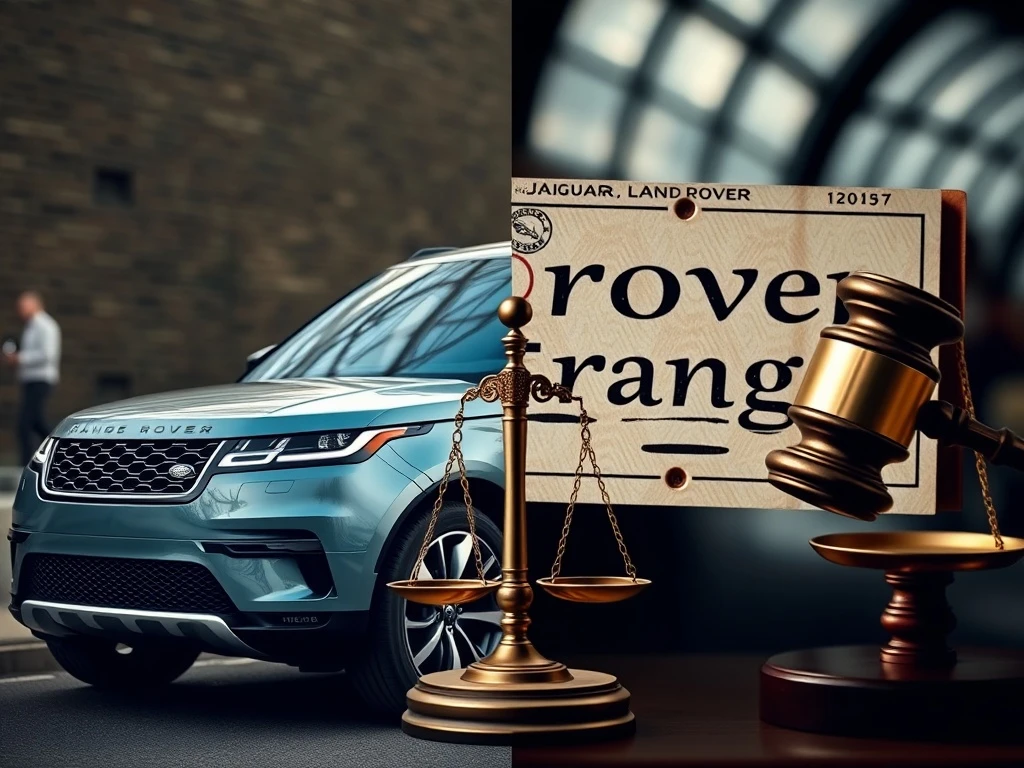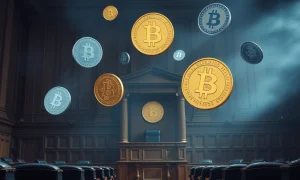A curious legal battle has unfolded, capturing the attention of both the automotive and transport sectors. Jaguar Land Rover, the iconic British car manufacturer, has initiated legal proceedings against National Rail. This dispute centers on National Rail’s long-standing use of the terms “rover” and “ranger” for its popular rail tickets. This unexpected move raises significant questions about trademark law and brand protection in a dynamic business landscape.
Jaguar Land Rover’s Bold Move Against National Rail
On August 16, 2025, Jaguar Land Rover (JLR) officially escalated its concerns. The Indian-owned carmaker issued a cease-and-desist letter to the Rail Delivery Group (RDG). The RDG manages the National Rail website and oversees various train operator services. JLR’s core argument states that the terms “rover” and “ranger” infringe upon its well-established Range Rover trademark. This claim suggests a potential for consumer confusion or brand dilution.
According to a memo obtained by The Telegraph, train operators received clear instructions. They were told to remove all references to “ranger” and “rover” from their digital platforms. This directive prompted immediate action across the rail network. The RDG, however, offered a practical solution. It advised companies they could continue marketing these popular tickets under amended names. JLR reportedly indicated it would not pursue further action against retailers complying with this adjustment. This approach suggests a desire for resolution rather than prolonged litigation.
The Historical Context: ‘Rover’ Tickets Predate Range Rover
The historical timeline provides a fascinating counterpoint to Jaguar Land Rover’s claims. “Rover tickets,” offering unlimited rail travel for a week, significantly pre-date the Range Rover vehicle. British Rail introduced its first All-Line Rail Rover ticket in the 1950s. At that time, a second-class ticket cost £15. This amount is equivalent to approximately £304 in today’s currency, considering inflation. In contrast, a modern seven-day All-Line Rover second-class ticket is priced at £650. The first Range Rover, a groundbreaking luxury SUV, was not unveiled until 1970. Therefore, the railway terms have been in continuous use for decades longer than JLR’s celebrated vehicle.
This historical precedence forms a crucial part of the Rail Delivery Group’s defense. A spokesperson for the RDG commented on the situation. They stated, “We are confident that our practices have always complied with intellectual property law. We were happy to work with Jaguar Land Rover towards a resolution.” The spokesperson further explained, “After being made aware of a trademark query by JLR, we worked closely with them to make a minor change to how we describe our Ranger tickets and Rover tickets.” This statement underscores the RDG’s belief in its legal standing and its willingness to cooperate.
Understanding Trademark Law: Generic vs. Distinctive Marks
This dispute highlights key aspects of trademark law. Trademarks protect distinctive words, symbols, or phrases. They help consumers identify the source of goods or services. The core principle involves preventing a “likelihood of confusion” among consumers. For instance, would a consumer mistakenly believe a “rover ticket” is associated with Jaguar Land Rover? This is the central question.
However, trademark law also considers whether a term is generic. Generic terms refer to a class of products or services, like “automobile” or “computer.” Such terms cannot be trademarked exclusively. The terms “rover” and “ranger” have long been associated with travel, exploration, or even specific types of vehicles (e.g., lunar rover, park ranger). National Rail could argue these terms are generic or descriptive of travel passes. Furthermore, they might contend that the public has clearly differentiated between a rail ticket and a luxury car for decades. This argument could challenge JLR’s claim of infringement or dilution.
Jaguar Land Rover’s Brand Protection Strategy
For a premium brand like Jaguar Land Rover, brand equity is paramount. Brand equity represents the value a brand adds to a product. Strong brands command higher prices and foster greater customer loyalty. Protecting trademarks is therefore a critical component of maintaining brand value. Even seemingly minor infringements can, over time, dilute a brand’s distinctiveness. This is particularly true for luxury brands that rely heavily on their unique identity and perceived exclusivity.
JLR’s action, therefore, can be seen as a proactive measure. It aims to safeguard its intellectual property and prevent any potential weakening of its Range Rover trademark. The company invests heavily in marketing and brand building. Consequently, it has a vested interest in ensuring its brand names remain uniquely associated with its products. This strategy is common among global corporations. They vigilantly monitor and defend their trademarks against any perceived misuse, regardless of historical precedent.
National Rail’s Approach to Resolution
The Rail Delivery Group’s response demonstrates a pragmatic approach. Rather than engaging in a protracted legal battle, they opted for a swift, albeit minor, change. This strategy minimizes disruption to their services and avoids costly litigation. By adjusting how they describe the tickets, they aim to satisfy JLR’s concerns without abandoning their popular product lines. This move reflects a desire to resolve the issue amicably. It also protects their operational continuity.
The RDG’s confidence in its historical compliance with intellectual property law is notable. Their quick adaptation suggests a focus on business continuity. They likely weighed the cost and potential negative publicity of a legal fight against the relatively simple act of rephrasing. Ultimately, this cooperative stance allowed both parties to reach a preliminary understanding. It prevented a full-blown court case, at least for now.
Broader Challenges Facing Jaguar Land Rover
This trademark dispute does not occur in isolation. Jaguar Land Rover faces wider scrutiny and significant internal changes. Earlier this month, US President Donald Trump publicly criticized the company. He claimed JLR was in “absolute turmoil” following a “totally disastrous woke” rebrand. Trump specifically referenced a recent advert featuring brightly dressed models. He compared it unfavorably to “Bud Lite going woke,” a reference to another controversial marketing campaign.
Beyond external criticism, JLR is undergoing substantial internal upheaval. In July, Chief Executive Adrian Mardell announced his resignation. He will step down at the end of the year after more than three decades with the firm. The business is also in the midst of a major restructuring. This includes cutting 500 UK management roles through a voluntary redundancy program. These organizational changes highlight a period of significant transition for the automotive giant.
Navigating a Period of Transformation
The company’s strategic direction involves a radical shift. Jaguar Land Rover has committed to repositioning Jaguar as an electric-only luxury car brand from 2026. This move represents one of the most transformative periods in its history. It requires massive investment, technological innovation, and a complete re-evaluation of its market position. Such ambitious goals naturally bring internal pressures and external scrutiny. The trademark dispute, therefore, adds another layer of complexity to an already challenging period.
The combination of leadership changes, workforce reductions, and a monumental shift to electrification paints a picture of a company in flux. Managing its brand image and protecting its intellectual property becomes even more crucial during such times. Every aspect of the business, from product development to marketing and legal affairs, must align with its future vision. This includes diligently defending its core brand assets.
In conclusion, Jaguar Land Rover’s legal threat against National Rail over ticket names is more than a simple trademark dispute. It reflects a broader corporate strategy focused on rigorous brand protection. While the historical use of “rover” and “ranger” tickets predates the Range Rover, JLR’s actions underscore the relentless efforts companies undertake to safeguard their valuable intellectual property. This case also highlights the various challenges a major automotive firm like JLR navigates in a rapidly evolving global market, from brand perception to technological transformation and internal restructuring. Ultimately, the amicable resolution between JLR and the RDG suggests a pragmatic approach to intellectual property challenges, allowing both entities to continue their operations with minor adjustments.
Frequently Asked Questions (FAQs)
Why did Jaguar Land Rover threaten legal action against National Rail?
Jaguar Land Rover (JLR) threatened legal action because it believes National Rail’s use of the terms “rover” and “ranger” for its rail tickets infringes upon JLR’s Range Rover trademark. JLR aims to protect its brand identity and prevent potential consumer confusion or dilution of its valuable intellectual property.
How long have ‘rover’ and ‘ranger’ tickets been in use?
“Rover” tickets have been in use for significantly longer than the Range Rover vehicle. British Rail introduced its first All-Line Rail Rover ticket in the 1950s. The first Range Rover was not unveiled until 1970, meaning the rail ticket names predate the car by over a decade.
What was the Rail Delivery Group’s (RDG) response to JLR’s demands?
The Rail Delivery Group (RDG) stated confidence in their compliance with intellectual property law. They worked with JLR to make a “minor change” to how they describe their Ranger and Rover tickets. This pragmatic approach helped avoid a prolonged legal battle, ensuring continued operation with minimal disruption.
Are there other challenges currently facing Jaguar Land Rover?
Yes, Jaguar Land Rover is facing several other significant challenges. These include external criticism, such as US President Donald Trump’s comments on a recent “woke” rebrand, internal upheaval with the CEO’s resignation, and a major restructuring involving 500 UK management role cuts. The company is also undergoing a massive transformation to become an electric-only luxury car brand by 2026.
What does this dispute mean for brand protection in business?
This dispute underscores the critical importance of brand protection for businesses, especially for premium and luxury brands. It demonstrates that companies vigilantly monitor and defend their trademarks, even against terms with long historical usage, to maintain brand distinctiveness and prevent dilution in the marketplace. It highlights the proactive measures companies take to safeguard their intellectual property assets.






